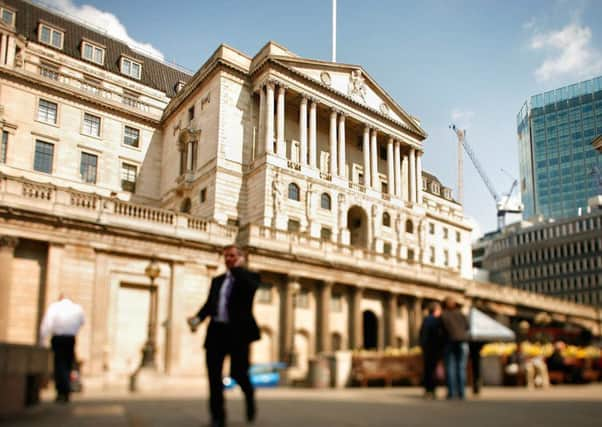Inflation blow puts possible interest rate rise on the cards


Consumer price inflation held at an annual rate of 3 per cent last month, unchanged from December, the Office for National Statistics (ONS) said. That followed price rises hitting their highest since March 2012 in November at 3.1 per cent.
In that month, the Bank of England (BoE) raised interest rates by a quarter-point to 0.5 per cent from historical lows, the Bank’s first monetary tightening in a decade.
Advertisement
Hide AdAdvertisement
Hide AdCalum Bennie, savings expert at mutual investment group Scottish Friendly, said: “The negative disparity between wage increases and the cost of living goes on, which turns the heat up on (BoE governor Mark Carney) to raise interest rates in an effort to bring down inflation. He has been known for raising several false alarms in the past, but it looks like the Bank of England’s warning last week that interest rates are set to rise is the real deal.”
Bennie said an upwards move in rates would be “music to the ears” of savers who have seen inflation eat into the value of their savings, but less welcome to mortgage holders and borrowers “who now appear to be on borrowed time”.
On the currency markets, the pound rose 0.5 per cent against the dollar after the ONS data.
Economist Lucy O’Carroll of Aberdeen Standard Investments said inflation looked to have peaked as the impact of sterling’s fall after the Brexit vote began to fade.
“Even if inflation drops back a bit further from here, it looks likely to settle at a higher level than the Bank of England feels comfortable with. It will also mean slightly higher interest rates than we’ve been used to,” she said.
Economists said the stubbornly high inflation in January meant UK households were faced in the near-term with falling living standards and rising mortgage bills.
The Bank of England monetary policy committee warned last week that, partly due to stronger worldwide economic demand, UK rates would have to rise sooner and to a “greater extent” than previously anticipated.
However, some economists believe a rate rise in April or May is not a certainty because of recent surveys showing the economy’s growth slowed at the beginning of the year, including the key services sector.
Advertisement
Hide AdAdvertisement
Hide AdIHS Markit’s Chris Williamson said: “While the stickiness of inflation will make for itch-trigger fingers among rate-setters, the signs of the economy faltering faltering suggest there’s a risk of a higher interest rate exacerbating a nascent slowdown.”
The inflation data compared with a consensus City expectation for a fall to 2.9 per cent. Core consumer price inflation – excluding food, energy, alcohol and tobacco – rose to 2.7 per cent from 2.5 per cent.